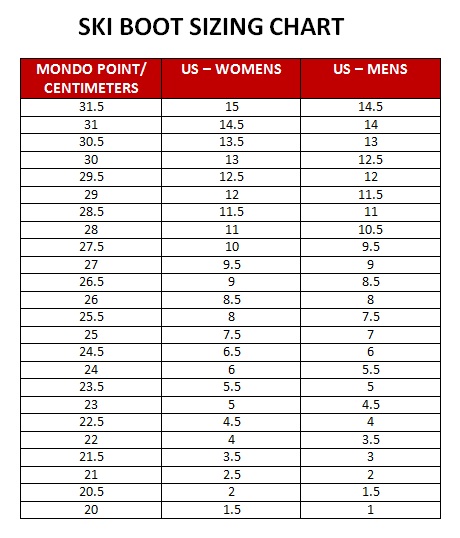Finding the Perfect Ski Boot Fit: Your Guide to Sizing
Stepping into a pair of ski boots can feel like stepping into a whole new world – one where comfort and performance are intricately linked. But before you hit the slopes, a crucial question arises: what size ski boots do I need? Finding the right fit is paramount for enjoying your skiing experience, preventing injuries, and maximizing your control on the mountain. This guide will unravel the mysteries of ski boot sizing, providing you with the knowledge and tools to find your perfect match.
Unlike regular shoes, ski boots aren't about roomy comfort. They're about precision and control, demanding a snug fit that translates your movements directly to your skis. A boot that's too large can lead to blisters, foot fatigue, and reduced control, while a boot that's too small can restrict circulation and cause pain. So, how do you navigate the world of Mondopoint sizing, shell fit, and liner customization to find the Goldilocks fit – not too big, not too small, but just right?
Determining the correct ski boot size begins with understanding the Mondopoint system, a universal sizing metric based on the length of your foot in centimeters. This system allows for a more precise fit than traditional shoe sizing. To measure your Mondopoint size, trace your foot on a piece of paper, measure the longest distance from heel to toe in centimeters, and then consult a Mondopoint size chart. However, keep in mind that this is just the starting point. Factors like foot width, arch height, and calf volume also play crucial roles in finding the right boot.
The history of ski boots is one of constant evolution, from rudimentary leather designs to the high-tech, customizable boots we see today. Early ski boots were designed primarily for uphill travel, prioritizing warmth and basic functionality. As downhill skiing gained popularity, the focus shifted towards performance and control, leading to the development of stiffer, more form-fitting boots. The introduction of the Mondopoint sizing system in the 1970s marked a significant step towards standardized sizing, simplifying the process of finding the right fit.
The importance of proper ski boot fit cannot be overstated. It directly impacts your comfort, performance, and safety on the slopes. A well-fitted boot allows for efficient power transfer, enabling you to control your skis with precision and responsiveness. It also provides crucial support and stability, minimizing the risk of injuries like ankle sprains and fractures. Conversely, an ill-fitting boot can lead to discomfort, blisters, cold feet, and difficulty controlling your skis, significantly diminishing your enjoyment of the sport.
Benefits of Correctly Sized Ski Boots:
1. Enhanced Performance: A snug fit allows for direct power transfer from your legs to your skis, maximizing control and responsiveness.
2. Increased Comfort: A properly fitted boot prevents pressure points, blisters, and numbness, ensuring a more enjoyable skiing experience.
3. Improved Safety: A supportive boot provides stability and reduces the risk of ankle and knee injuries.
Steps to Finding Your Perfect Fit:
1. Measure your Mondopoint size.
2. Visit a reputable ski shop and consult with a boot fitter.
3. Try on several different boot models and brands.
4. Have the boot fitter assess the fit and make adjustments as needed.
5. Walk around in the boots for at least 15 minutes to ensure comfort.
Advantages and Disadvantages of Different Ski Boot Flex Ratings
| Flex Rating | Advantages | Disadvantages |
|---|---|---|
| Soft | More forgiving, easier to flex, good for beginners | Less responsive, less precise control at higher speeds |
| Medium | Versatile, good balance of comfort and performance | May not be ideal for very aggressive skiers or beginners |
| Stiff | Precise control, responsive, ideal for aggressive skiers | Can be demanding, less comfortable for beginners or less aggressive skiers |
Frequently Asked Questions:
1. What is Mondopoint sizing? (Answer: A sizing system based on foot length in centimeters.)
2. How do I measure my Mondopoint size? (Answer: Trace your foot, measure the longest distance from heel to toe.)
3. Can I buy ski boots online? (Answer: While possible, it's highly recommended to visit a boot fitter for a professional fitting.)
4. What are the different types of ski boots? (Answer: Various types exist, categorized by flex rating, skill level, and intended use.)
5. How tight should my ski boots be? (Answer: Snug, but not painful. Your toes should barely touch the front when standing upright, and move back slightly when flexing forward.)
6. What are custom footbeds? (Answer: Insoles molded to the specific contours of your feet for enhanced comfort and support.)
7. How often should I replace my ski boots? (Answer: Depends on usage, but generally every 5-10 years or when the liners pack out significantly.)
8. What should I wear with my ski boots? (Answer: Thin ski socks made of moisture-wicking material.)
Conclusion:
Finding the perfect ski boot fit is an essential step towards enjoying a comfortable and rewarding skiing experience. By understanding the nuances of Mondopoint sizing, considering your individual foot characteristics, and seeking expert advice from a boot fitter, you can ensure that your boots provide the optimal balance of comfort, performance, and safety. Investing the time and effort in finding the right fit will pay dividends on the slopes, allowing you to focus on what matters most – carving turns and enjoying the thrill of the mountain. Remember, a comfortable skier is a happy skier, and well-fitting ski boots are the foundation of a successful day on the snow. So, take the time to get it right, and your feet will thank you for it! Don't hesitate to ask questions and experiment with different models until you find the perfect match. Your skiing adventures await!
Crafting your perfect roblox persona a guide to display names
Ultimate nfl domination super bowl victories
Back to nature exploring the beauty of floral back tattoos














